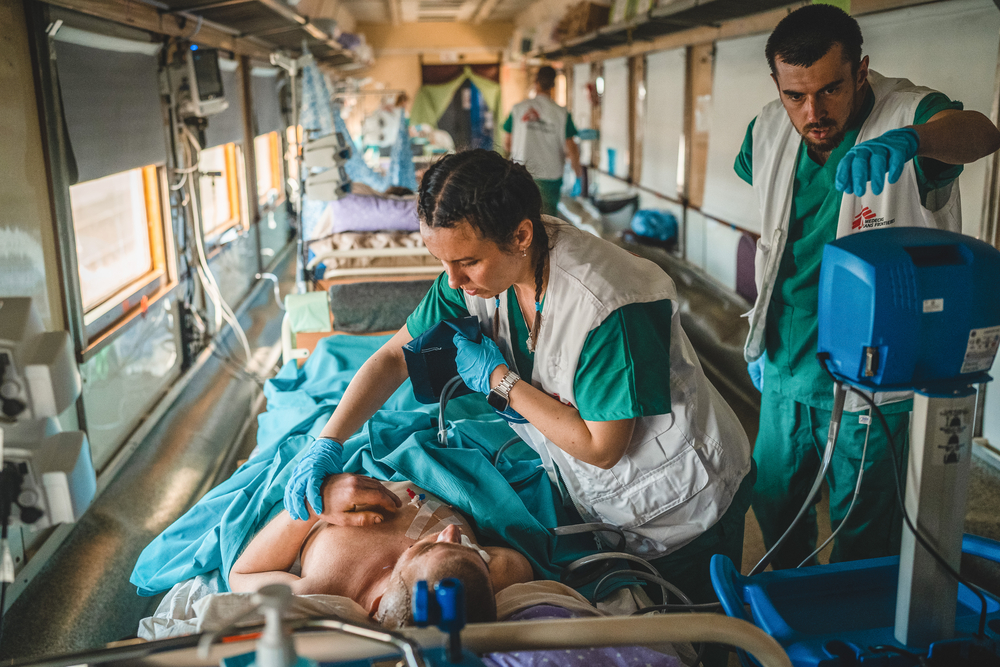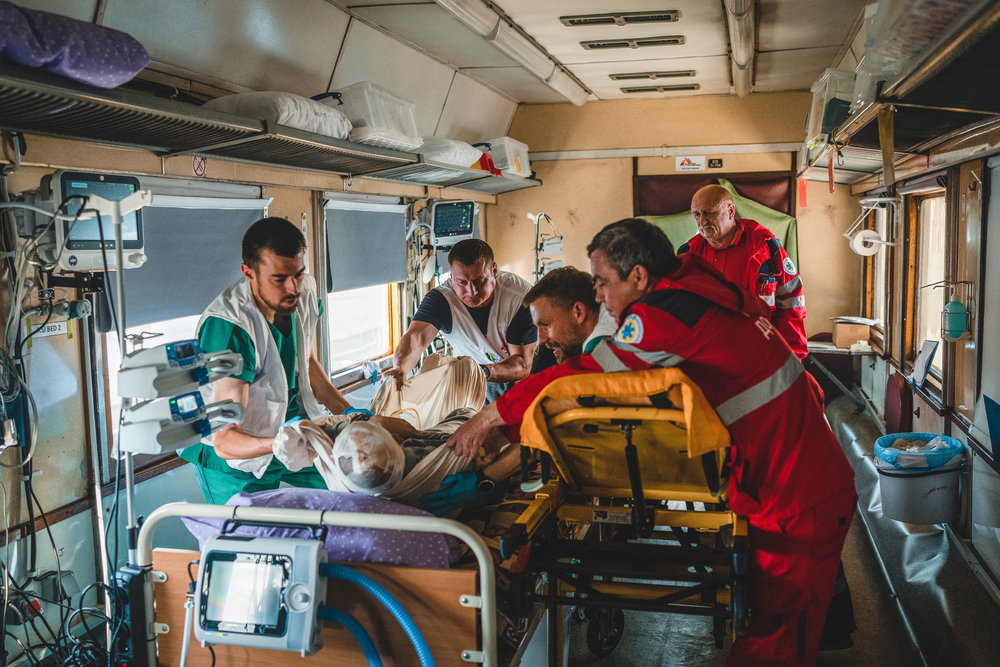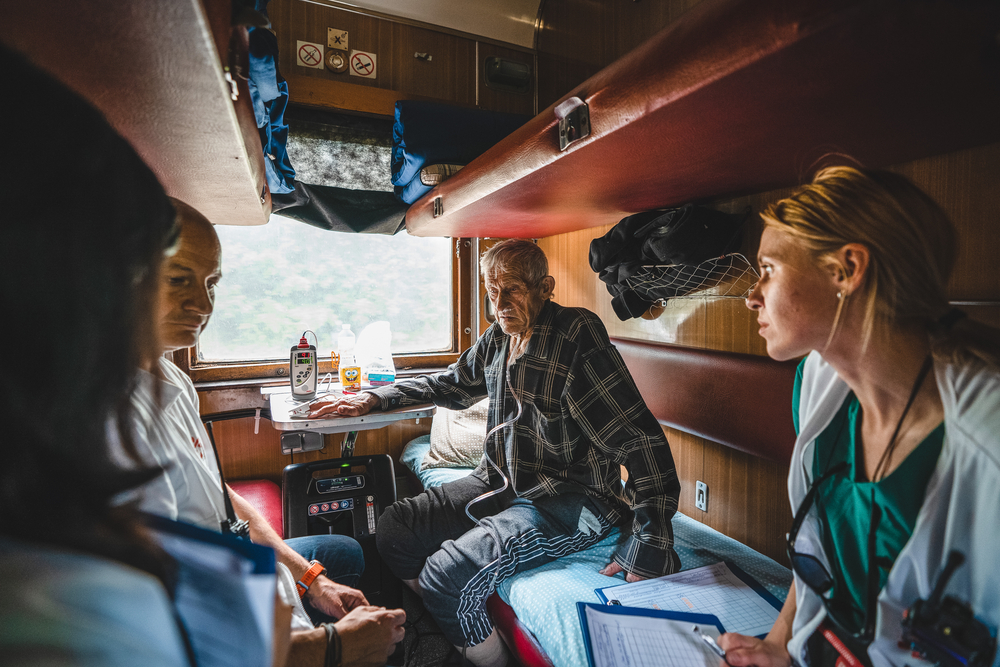War in Ukraine: On board MSF’s ‘hospital on rails’
Every week, a specialised medical train evacuates patients from frontline hospitals in eastern Ukraine. Many of those on board share their traumatic stories with us.
Artur Struminskyy, a nurse assistant with Médecins Sans Frontières / Doctors Without Borders (MSF), shares his deeply moving experience of caring for people on their journey to relative safety.
I am both Italian and Ukrainian. I moved with my family to Italy as a teenager. I came back to Ukraine on 23 February 2022. I knew about the risks of war but I had to take care of urgent family matters. I stayed in Brody, a small city in the Lviv district.
At four in the morning, I heard many jets circling over the city. Then the first news came in about massive attacks on Kyiv and Odesa. At seven in the morning, our city was under missile attack.
I gathered my aunt, my little niece, my grandmother and my mother and brought them by car to the Polish border. The situation was chaotic. There were thousands of people, impossible to count. We stayed on our feet for around 30 hours in the cold.
I knew that I would not be able to cross the border as a male Ukrainian citizen of military age. I returned to Brody and asked myself what I could do.
Explained: MSF’s medical evacuation train
In late March, MSF began developing and converting a train to evacuate critical referral patients from frontline hospitals in the east of Ukraine.
As of 6 June, 653 patients (as well as relatives) have been transported to healthcare facilities in safer parts of western Ukraine.
Journeys on board this ‘highly medicalised’ train usually take 20 to 30 hours, during which time patients are cared for by a team of experienced doctors and nurses.
More than 40 percent of war-wounded patients have been children or elderly people – the majority with blast injuries, followed by shrapnel and gunshot wounds. At least 10 percent have lost one or more limbs to a traumatic amputation, the youngest patient being just six years old.
I have worked in the humanitarian field for the past 18 years. I believe that in a situation like this, everyone has their role.
I saw that MSF was looking for medical staff for the train project. I sent my CV and they asked me when I could start. I said straight away.
Never miss an update
Get the latest news on war and conflict with our email newsletter, Frontline.
You'll also receive our best stories, critical updates and unique ways to get involved.
MSF’s highly medicalised train has a setup very similar to a hospital with an intensive care unit (ICU).
On my first trip, I supported the team in the ICU. In the beginning, I was a little anxious. Even though I had extensive experience working in emergency settings, I had obviously never worked on a medical train before.
The scale of suffering
We see different types of patients on the train. The elderly with chronic diseases trapped in the conflict as well as the children with multiple trauma injuries.
It is hard to imagine how many civilians become victims in this conflict. Until you end up in an armed conflict yourself, you cannot believe how many victims it creates. But, trip by trip, you see all these people with blast injuries, bone fractures, amputations...
You start to have an idea of the scale of the suffering inflicted on these people.
Some trips back, we had a 15-year-old girl with extensive damage to her abdominal area as well as fragmentations of her spinal cord as a result of a bomb blast.
Even though we all knew what she had been through, she kept a positive attitude and smiled at me and the other medical staff every time we checked on her or passed by her bed. She showed me what resilience can look like even when you’ve been heavily injured. This was a pretty strong experience and very rewarding.
No right words
During one trip we had a man on the train together with his eight-year-old daughter and his grandmother. He was in a lot of pain as he had an amputated leg and the other one was broken.
He said, “I have two problems. I am in a lot of pain with my leg”.
I replied, “No problem. We will manage your pain with medication. And what is the other issue?”
He said, “As you can see, I have my daughter with me. I still haven’t found the courage to tell her that her mother died. I was with her when it happened. I saw her dying next to my side.”
They were grocery shopping together when an artillery attack happened at the supermarket. This man saw his wife die and struggled in all his pain to tell his daughter that her mother had passed away.
There was another intense moment when I treated a woman with a blast injury who was accompanied by her adult son. I asked her what had happened to better understand the cause of the trauma, so that we could make sure she gets the best possible care on board the train.
She told me how she came under bombing and that she saw her other son and her husband dying.
There are no right words that you can say in this moment. All you can do is give a hand and a compassionate look and stay with her until she disembarks.
A peaceful sky
The work on the train has made me appreciate the peace that I took for granted before the war.
Now I understand what a clear sky means – a peaceful sky. Maybe in the past I was a little egoistic. I was thinking about my development, about my future.
This experience taught me that war is everywhere. Next time you could be the person that needs help.
MSF and the war in Ukraine
Fighting in Ukraine has killed or injured thousands of people, while more than 5.6 million refugees have fled to neighbouring countries.
Médecins Sans Frontières / Doctors Without Borders (MSF) teams are working to deliver emergency medical aid to people still in Ukraine, as well as those now seeking safety in neighbouring countries.



